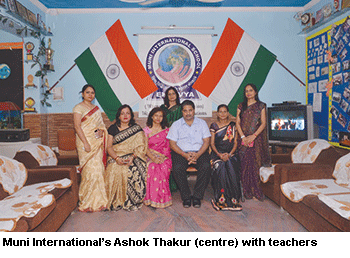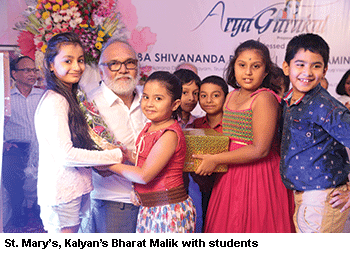The main allure of budget private schools, which are acceptable alternatives to dysfunctional government schools for low-income households, is that they offer English medium education
 For the vast majority of poor households in India unable to afford private schools designed for the middle class and forced to enroll their children in dysfunctional state government schools, the estimated 300,000 budget private schools (BPS) which have mushroomed countrywide, provide an acceptable alternative. The main allure of BPS, typically crammed into small rented premises, family homes, and even rooms above shops, charging tuition fees ranging from Rs.70-150 per month in rural areas and Rs.200-600 in urban India, is the English medium education they offer — which all except state governments plugging vernacular languages for sub-nationalist and parochial reasons, know is the language of social and employment upward mobility. Although not ‘recognised’ by government, they are perceived to also offer better facilities, teachers and student learning outcomes than the country’s failing government schools.
For the vast majority of poor households in India unable to afford private schools designed for the middle class and forced to enroll their children in dysfunctional state government schools, the estimated 300,000 budget private schools (BPS) which have mushroomed countrywide, provide an acceptable alternative. The main allure of BPS, typically crammed into small rented premises, family homes, and even rooms above shops, charging tuition fees ranging from Rs.70-150 per month in rural areas and Rs.200-600 in urban India, is the English medium education they offer — which all except state governments plugging vernacular languages for sub-nationalist and parochial reasons, know is the language of social and employment upward mobility. Although not ‘recognised’ by government, they are perceived to also offer better facilities, teachers and student learning outcomes than the country’s failing government schools.
 Yet instead of helping BPS edupreneurs to improve and upgrade their institutions with financial aid and advice, education officials of state governments are either shaking them down or closing them for non-compliance with s.19 and Schedule of the Right of Children to Free and Compulsory Education Act, 2009 (aka RTE Act), which makes it mandatory for all schools to comply with minimal infrastructure and teacher-pupil ratio norms. The Delhi-based think tank Centre for Civil Society (CCS) estimates that over 3,000 private budget schools countrywide have been shut down for non-compliance with the RTE Act and another 5,097 issued closure notices.
Yet instead of helping BPS edupreneurs to improve and upgrade their institutions with financial aid and advice, education officials of state governments are either shaking them down or closing them for non-compliance with s.19 and Schedule of the Right of Children to Free and Compulsory Education Act, 2009 (aka RTE Act), which makes it mandatory for all schools to comply with minimal infrastructure and teacher-pupil ratio norms. The Delhi-based think tank Centre for Civil Society (CCS) estimates that over 3,000 private budget schools countrywide have been shut down for non-compliance with the RTE Act and another 5,097 issued closure notices.
In 2015, EducationWorld, which ab initio has protested the discriminatory s.19 of the RTE Act (whose penal provisions exempt government schools) and advocated promotion of new schools at various price points, introduced the country’s first national league table of budget private schools to confer recognition and appreciation upon the best among them. The rankings exercise is conducted with the aid and advice of CCS and the National Independent Schools Alliance (NISA, estb.2011), a representative organisation of budget private schools. For the 2017-18 rankings of India’s best budget private schools, CCS/NISA shortlisted 25 well-managed BPS’ in several major cities. Subsequently, field representatives of C fore interviewed 1,022 SEC (socio-economic category) C, D and E parents to rate them on 12 parameters of school education excellence.
In the third EW Budget Private Schools Rankings 2017-18, the sample respondents have once again voted the Muni International School (MIS), Delhi, India’s #1 private budget school followed by St. Mary’s High School, Kalyan, Mumbai, at #2. Further down the Top 10 table there’s been upheaval with the SR Capital Public School, Delhi moving up to #3 (#5 in 2016) and Don Bosco High School, Dombivli (W), Mumbai leapfrogging to #5 (10) while Pragathi Vidyalaya, Hyderabad has retained its #4 rank.
Consequently Little Flower Matriculation School, Chennai has slipped to #6 (3), Angels Babyland Matriculation, Chennai to #9 (7) and Ashwini Public School, Bangalore to #10 (8). St. Mary’s English School & Jr. College, Kandivali, Mumbai has debuted into the Top 10 table at #8 (12) as has the previously unranked NES High School Bhandup, Mumbai at #10.
Promoted in 2002 by Ashok Thakur, an alumnus of Delhi University and ex-serviceman, Muni International is top-ranked on six of the 12 parameters of education excellence. “We are delighted to receive this recognition for the third year in succession and will continue to do our best to meet the rising expectations of the public. EducationWorld has done a great service by ranking budget private schools as they enroll the largest number of students among private schools in India. At Muni we have taken great pains to adopt curriculums and pedagogies which are affordable and results oriented. Our students use computer tablets, participate in community outreach programmes and are trained in life skills even as our highly-motivated teachers enable them to improve their learning outcomes. We are ready to share our unique low-cost model of education with government as well as other low-cost private schools across India,” says Thakur, founder-principal of Muni International which has an enrolment of 713 students and 30 teachers.
Bharat Malik, the energetic promoter-chairman of St. Mary’s High School, Kalyan, Mumbai (estb.1989), is equally delighted with the school’s #2 ranking for the third consecutive year. “We are pleased with our high second rank for the third year in a row. Our children come from under-privileged backgrounds but have high aspirations to succeed. To prepare them for the challenges of life and the workplace, we have adopted a unique teacher-student mentoring programme under which teachers not only help students in academics but also guide them to acquire important life skills. Sports and skills-based education are the other areas we focus on to enable comprehensive development. Over the next year we have made plans to initiate student and teacher exchange programmes with other schools,” says Malik.
Odeal D'Souza
To view Budget Private Schools Schools Rankings 2017, please visit: http://www.educationworld.in/rank-school/all-cities/budget-private-school/2017.html